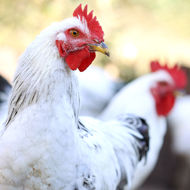New service offers testing for exclusion of NAD

At first only chickens and turkeys will be tested but this may be rolled out to include other species in the future.
AHVLA has begun offering poultry keepers and vets a new service, testing for the exclusion of notifiable avian diseases (NAD).
The service started on May 23 and will initially be piloted for one year. It is available to poultry keepers and vets from the National Reference Laboratory, AHVLA Weybridge.
Testing is intended specifically for cases where NAD is not suspected but cannot be ruled out entirely.
Initially only turkey and chicken flocks will be tested but if the service is successful this may be rolled out to other species in the future.
In a letter to the Veterinary Record on May 24, chief veterinary officer Nigel Gibbens et al said: "This service may help to detect NAD at the earliest opportunity in those cases where the clinical signs do not give rise to a level of suspicion of a NAD that justifies either a consultation case or statutory notification and official enquiry in the first instance."
Private veterinary surgeons can submit samples to AHVLA after a telephone discussion with an AHVLA duty vet, where it is agreed that NAD is not suspected.
AHVLA testing will be carried out using PCR methods, taking swabs from the oropharynx and cloaca. The agency will charge the full cost for testing.
Results will usually be available within 48 hours, where samples are submitted on weekdays. Arrangements for out-of-hours submission and testing will also be available. Positive test results will trigger an official AHVLA investigation.
For more information, see the AHVLA website.



 HMRC has invited feedback to its communications regarding the employment status of locum vets and vet nurses.
HMRC has invited feedback to its communications regarding the employment status of locum vets and vet nurses.